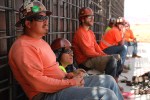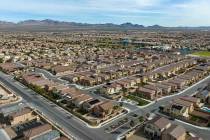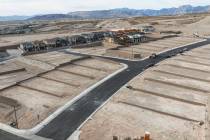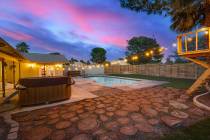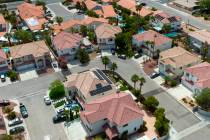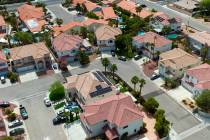U.S. foreclosure activity rises, but Nevada tumbles 62 percent
LOS ANGELES — More U.S. homes are entering the foreclosure process, setting the stage for a surge in properties repossessed by lenders this year.
The number of homes that received first-time foreclosure notices rose 7 percent in March from the previous month, foreclosure listing firm RealtyTrac Inc. will say in a report today .
That marks the third consecutive monthly increase this year and reflects stepped-up efforts by banks to take action against homeowners who fail to keep up with mortgage payments.
“We’re not out of the woods yet with foreclosures,” said Daren Blomquist, a vice president at RealtyTrac. “There are more batches of foreclosures coming through the pipeline.”
Foreclosure activity in the first quarter fell primarily in states where the courts do not play a role in foreclosures. Among them: Arkansas (79 percent), Nevada (62 percent) and Arizona (21 percent).
In contrast, many states where courts must sign off on foreclosures saw outsized increases foreclosure activity, including Indiana (45 percent), Connecticut (38 percent) and Florida (26 percent).
David Brownell, broker for Keller Williams Realty in Las Vegas, reported a total real estate-owned, or bank-owned, inventory of 986 homes in March, a 62 percent decrease from 2,581 a year ago. Forty percent of the 4,198 escrow closings in March were real estate-owned.
Foreclosure activity, as measured by the number of homes receiving foreclosure-related notices, slowed sharply in the fall of 2010 when claims surfaced that some banks and mortgage servicers were processing foreclosures without verifying documents.
Notice of default filings in Nevada have dropped dramatically since October when the robo-signing law went into effect requiring lenders to provide documentation of authority to foreclose. Nevada’s county recorders counted 346 NODs in January, compared with 5,019 in the same month a year ago.
“There’s talk of a second tsunami of foreclosures. I don’t see that coming,” Brownell said. “It seems like the rush and the bulk of foreclosures was up front. We’re going to be dealing with short sales and foreclosures for the next 10 years, but I don’t see them being dumped on the market where prices drop another 20 percent.”
Foreclosures typically sell at a discount to other homes and can drag down the value of neighboring properties, so the prospect of more foreclosures means it could take longer for home prices in some areas to bounce back.
The U.S. housing market remains weak, even after the best winter for home sales in five years and steady improvement in the job market. Home prices are now back to 2002 levels, according to the Standard & Poor’s/Case-Shiller U.S. home price index.
Las Vegas housing analyst Dennis Smith of Home Builders Research said the local market is improving and moving in the right direction at this point of the recession. However, the recovery is being artificially stimulated by banks holding foreclosure inventory off the market, he said.
They’ve turned the housing inventory spigot to a trickle following legal issues and government backlash from the robo-signing scandal, Smith said. Ironically, they’ve created their own support mechanism to help the housing recovery.
“If this was a plan to help the housing industry, it worked,” the analyst said. “In our opinion, they have unintentionally helped themselves by holding back REOs, giving the market a chance to absorb some of the excess resale inventory.”
Rather than a large wave of bank-owned homes crashing onto the market at once, it’s likely the new crop of foreclosures will arrive in smaller waves throughout the year, Smith said.
Review-Journal writer Hubble Smith contributed to this report.







